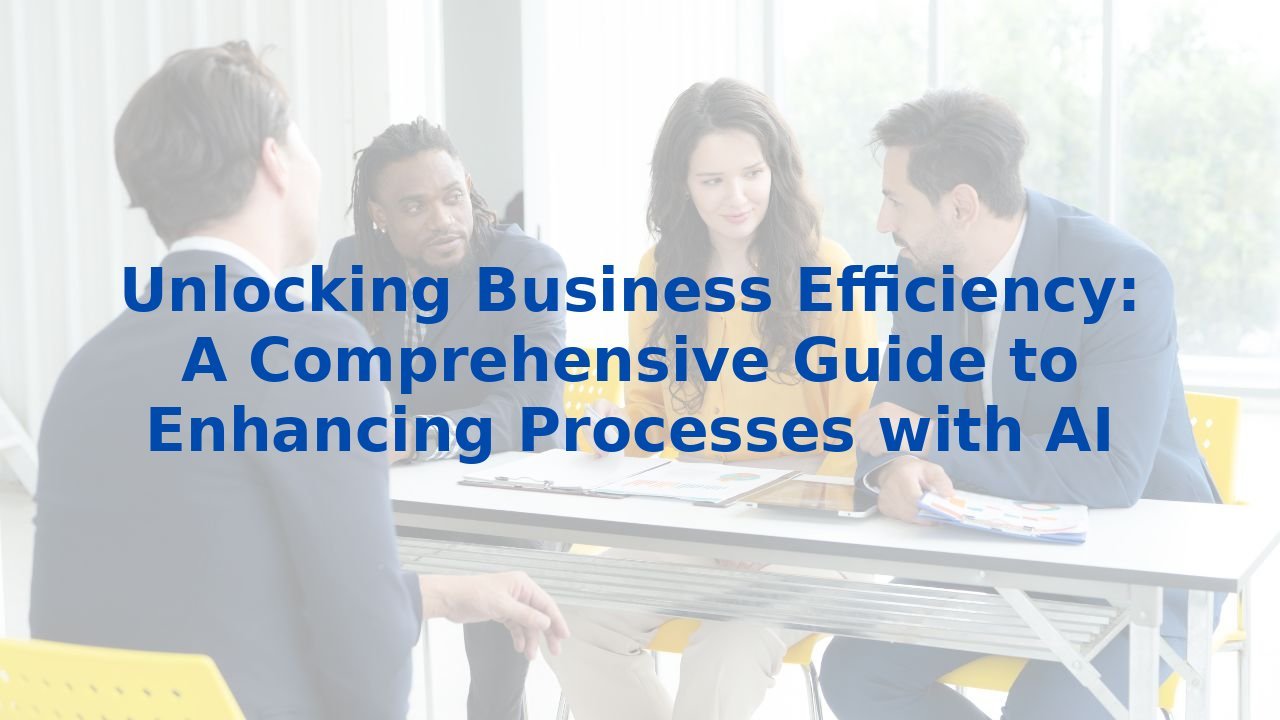Unlocking Business Efficiency: A Comprehensive Guide to Enhancing Processes with AI
Unlocking Business Efficiency: A Comprehensive Guide to Enhancing Processes with AI
In an era where time is of the essence and margins are tight, businesses must constantly seek ways to enhance efficiency, reduce operational costs, and strengthen decision-making capabilities. Enter Artificial Intelligence (AI), a revolutionary force capable of transforming various aspects of business processes. This guide dives deep into how AI can not only optimize existing processes but also unlock new levels of productivity within your organization.
1. Process Discovery and Mapping
Understanding your current processes is the first step to enhancing efficiency. AI plays a pivotal role in process discovery and mapping by employing techniques such as process mining. This approach uses pattern recognition and natural language processing to analyze data from various source systems like ERP or CRM software. The result? A clear, concise representation of your organizational processes, highlighting patterns and relationships that may otherwise go unnoticed. With this knowledge in hand, you can make informed decisions about where to focus your optimization efforts.
2. Process Automation
One of the most transformative advantages of AI is its ability to automate routine tasks. Imagine a world where data entry, scheduling, and basic inquiries are handled seamlessly by AI bots. This not only minimizes human errors but allows your workforce to dedicate their precious time to strategic initiatives that drive growth. By streamlining these processes, organizations can witness a remarkable boost in overall productivity and employee satisfaction.
3. Real-Time Monitoring and Optimization
With AI, real-time monitoring becomes a tangible reality. No longer do organizations need to rely on retrospective data to understand process efficiency. AI enables continuous surveillance of business workflows, allowing for immediate interventions to address issues or seizing on-the-spot opportunities. Coupled with AI-driven process optimization techniques, companies can quickly identify bottlenecks and areas for improvement, leading to sustained operational enhancements.
4. Enhanced Decision-Making
The decision-making landscape is also evolving with AI. By providing comprehensive insights from both structured and unstructured data, AI becomes an invaluable advisor. It processes vast amounts of information to identify trends, patterns, and even potential risks, equipping leaders to make informed decisions that consider multiple alternatives. This level of intelligence is what separates reactive businesses from proactive ones.
5. Predictive Analytics and Risk Management
Predictive analytics powered by AI assists businesses in navigating the uncertain waters of market dynamics. Through the analysis of historical data, AI can forecast future trends, helping organizations anticipate demand fluctuations or identify potential bottlenecks before they arise. This responsive capability not only strengthens risk management but fosters an agile organizational culture that embraces change and innovation.
6. Customer Service and Experience
AI is a game-changer in customer service. From sophisticated chatbots handling basic inquiries around the clock to advanced tools analyzing customer feedback for meaningful improvements, AI can revolutionize how businesses interact with their clientele. By automatically extracting insights and providing them to human agents, AI augments the customer support process, leading to faster, more accurate responses and, ultimately, an enhanced customer experience.
7. Product Development and Content Generation
In the realm of product development, AI's transformative power is equally notable. Generative design, which leverages AI algorithms to brainstorm multiple design solutions based on specified goals, is paving the way for more innovative outcomes. Furthermore, AI can streamline content generation efforts, automating the creation of product descriptions or marketing materials, thus enhancing both efficiency and quality.
The Benefits of Employee Training for AI
While AI indisputably offers vast potential, the human element remains crucial for its success. Training employees on AI technologies and capabilities maximizes its benefits:
- Understanding AI Capabilities: Training helps employees grasp the nuances of AI, allowing them to utilize the technology effectively without overestimating its capabilities.
- Data Quality: Well-trained employees know how to generate and submit high-quality data, greatly enhancing AI performance and accuracy in predictions.
- Adaptability: Equipped with the right knowledge, employees can seamlessly integrate AI into their workflows, fostering a culture of innovation.
- Informed Decision-Making: Employees trained in understanding AI insights can drive better strategic decisions, leading to improved outcomes for the organization.
Conclusion
The integration of AI into business processes stands as a catalyst for change, offering organizations a pathway to enhanced efficiency, reduced costs, and improved decision-making capabilities. By harnessing its power for process discovery, automation, real-time monitoring, predictive analytics, and superior customer service, organizations are not merely keeping pace but setting the benchmark for excellence. As we continue to navigate an ever-evolving business landscape, the importance of employee training in AI cannot be overstated—this investment can unlock the true potential of AI, ensuring your organization not only survives but thrives in the future.
By embracing and understanding these AI-driven enhancements, businesses can remain competitive while fostering a culture of continuous improvement and innovation.



